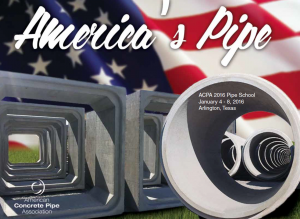| Precast, rigid concrete pipe (RCP) is the ideal choice for durable pipe system installations. In every region across the country, engineers, transportation departments and contractors know they can trust concrete pipe as the most resilient choice to last for over 100 years. At the American Concrete Pipe Association, we’re often asked about concrete pipe’s benefits. And we’re proud to say there are many reasons to choose concrete pipe. Here, we present the top 16 benefits of RCP: | |
| 1. | Strength. Precast concrete pipe is the strongest drainage pipe available and is manufactured to meet ASTM and AASHTO standards. Reinforced concrete pipe is a composite structure and specially designed to use the best features of both concrete and reinforcement. The concrete is designed for the compressive force, and the reinforcement for the tensile force. |
| 2. | Resilience. Concrete pipe is resilient and durable, defined in Webster’s dictionary as, “able to exist for a long time without significant deterioration.” With concrete pipe, durability deals with the life expectancy and enduring characteristics of its materials. |
| 3. | Dependability. Concrete pipe’s long-term performance is proven, not theoretical. Innovation has made concrete pipe more reliable and dependable than ever. This innovation includes improvements to concrete mixes, pipe design and manufacturing processes. |
| 4. | Structure and Conduit. Concrete pipe is a rigid pipe that provides both structure and conduit when it arrives on site. Unlike flexible alternatives, concrete pipe has little dependence on the surrounding soil for its structural performance. |
| 5. | Non-Flammable. Concrete pipe will not burn, corrode prematurely, deflect or reduce hydraulic performance, or collapse under loads designed into the pipe structure. |
| 6-7. | Cost and Value. Concrete pipe will easily meet the demands of Life Design as it remains the strongest, most hydraulically efficient, durable and environmentally friendly pipe available today. In short, concrete pipe’s attributes yield a lower long-term cost and more value for the owner. |
| 8-9. | Environmental Considerations. With its long life, use of natural/recycled products and local availability, concrete pipe is extremely environmentally friendly. |
| 10. | Ease and value of installation. Concrete’s strength facilitates successful installation. This lessens the liability on the owner, engineer and contractor. When proper installation is specified and inspected, concrete pipe has the lowest installed cost compared to alternative products. |
| 11. | Design/Construction Flexibility. Whether the project is open-cut, deep or shallow burial, tunnels or complex alignments, concrete pipe has the design and construction flexibility to meet the challenge. |
| 12. | Joint Performance. The rigid structure of concrete pipe joints allows for different designs from soil-tight to water-tight. Pressure rated joints are also available. |
| 13-14. | Mass and Hydraulic Performance. Concrete pipe has a number of built-in features that benefit design, installation and performance. The pipe’s mass makes it more durable to install and resistant to flotation. Precast concrete pipe’s rigidity and mass allow it to greatly outperform flexible pipe systems hydraulically. |
| 15. | Quality Control. Concrete pipe has the most rigorous quality control testing in the drainage industry. |
| 16. | Sustainability. The pipe’s capability to perform as expected for the design life of a project is a fundamental engineering consideration, especially in today’s economic environment, where requirements have been set in place to ensure a sustainable buried infrastructure. |
| Join the thousands of engineers who specify concrete pipe exclusively for these reasons. For more information about concrete pipe’s benefits, visit www.concretepipe.org. | |

One Response to 16 Reasons to Choose Concrete Pipe
ACPA is providing this information to our Concrete Pipe Industry Members with the most up to date information as possible. We have provided several specific updates below by individual categories […]
This is a demonstration of the comparative flammability of polypropylene pipe (PP), reinforced concrete pipe (RCP), and high density polyethylene pipe (HDPE). Dry hay is ignited in three 18 in. […]
Join us in Arlington, TX for this year’s Pipe Show, featuring the all new Pipe Show with B2B Exchange. For more information and registration, click here.
Fall Volume 52, No. 3 Summer Volume 52, No. 2 Spring Volume 52, No. 1 Winter Volume 51, No. 3
Fall Volume 53, No. 3 Summer Volume 53, No. 2 Spring Volume 53, No. 1 Winter Volume 52, No. 4
Fall Volume 54, No. 4 Summer Volume 54, No. 3 Spring Volume 54, No. 1 Winter Volume 53, No. 4
Fall Volume 55, No. 4 Summer Volume 55, No. 3 Spring Volume 55, No. 2
Fall Volume 56, No. 4 Summer Volume 56, No. 3 Spring Volume 56, No. 2
Fall Volume 57, No. 4 Summer Volume 57, No. 3 Spring Volume 57, No. 2 Winter Volume 57, No. 1


I don’t ordinarily comment but I gotta tell thanks for the post
on this great one :D.